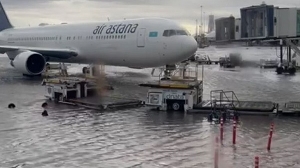- Home - News
- TWI News | TV
- Polls
- Year In Review
- News Archive
- Crime & Punishment
- Politics
- Regional
- Editorial
- Health
- Ghanaians Abroad
- Tabloid
- Africa
- Religion
- Election 2020
- Coronavirus
- News Videos | TV
- Photo Archives
- News Headlines
- Press Release
General News of Thursday, 24 May 2007
Source: --
Meeting of the Africa Partnership Forum
The 8th meeting of the Africa Partnership Forum (APF) has been held in the German capital, Berlin, just two weeks before the G8 Heiligendamm summit. As Germany currently holds the G8 Presidency, the APF was chaired by Germany’s Federal Development Minister, Heidemarie Wieczorek-Zeul together with Ghana’s Minister for Foreign Affairs, Nana Akufo-Addo (Representing the Current African Union Presidency – Ghana) and the Danish Development Minister Ulla Tornaes (Representing the OECD countries) and the Executive Head of the NEPAD Secretariat, Professor Firmino Mucavele.
The meeting which was opened by German Chancellor Angela Merkel, was to arrive at a joint recommendations on strategic and socio-economic issues relating to development in Africa for the G8 Summit in Heiligendamm and for the African Union.
Danish Prime Minister Anders Fogh Rasmussen, and Ghana’s Foreign Minister Nana Akufo-Addo addressed the Forum. Participants took the opportunity to look into four key areas critical to African development: investment, gender, climate change, and peace and security, as well as the status of the APRM process. The Form had four main agenda: Sustainable Investment in Africa, Economic Empowerment of Women, Peace and Security and Climate Change.
SIGNED JEFFERSON KWAMINA
SACKEY MEDIA RELATIONS OFFICER, MINISTRY OF FOREIGN AFFAIRS
(Below is the speech by Ghana’s Foreign Minister at the Forum)
SPEECH BY HON. AKUFO_ADDO AT THE 8TH APF IN BERLIN, GERMANY
It is a great honour for me to be here as the representative of the Chair of the African Union, the President of the Republic of Ghana, His Excellency John Agyekum Kufuor, to participate in this important event. As a result, my modest person has the distinction of sharing a podium with Prime Minister Anders Fogh Rasmussen of Denmark, the Chair of the powerful OECD, and the Chancellor of the Federal Republic, the celebrated Frau Angela Merkel, Germany’s first elected female leader, to address this distinguished audience, which includes one of Africa’s most distinguished leaders, President Festus Mogae of Botswana. President Kufuor has asked me to extend his warm greetings to all of you, great and small, and to wish this meeting, which seeks to reinforce Africa’s links with the world outside, full success.
We are grateful to the German government for making available to us such pleasant facilities for the conduct of our deliberations in this famous city of Berlin, a city which evokes so many memories for an African, especially a Ghanaian who is celebrating this year the anniversary of his country’s golden jubilee of independence from British colonial rule, the first African nation so to gain her freedom, the event that blazed the trail for the decolonisation and liberation of Africa. We remember that it was here, in the late 19th century, that the great European statesmen of their time, Otto von Bismarck and Benjamin Disraeli, met at the 1886 Berlin Conference to divide and apportion our continent, thereby putting the official seal on the subsequent eras of colonialism and imperialism. We remember, at the same time, the fall of the Berlin Wall, undoubtedly one of the catalytic moments of the 20th century, when Germany was reunited and a tremendous blow struck for freedom and equality for all the peoples of the world. I have no doubt that 1989, the year the Wall fell, will go down in European history as seminal a date for human progress as 1789, the year of the French Revolution. It is, thus, entirely appropriate that we should be looking in such a setting at the future of the relationship between Africa and Europe, which is at the heart of this forum for partnership.
This periodic process of review is particularly apposite this year, for, at its end, the long delayed Europe-Africa Summit will finally take place in Portugal during the Portuguese Presidency of the EU in the second half of this year. To that end, the AU Chair, President Kufuor, has already met in Lisbon with the Portuguese leadership, President Anibal Cavaco SILVA and Prime Minister José SOCRATES, to engage on the date and agenda of the Summit. The principal outcome of the Summit will, hopefully, be to adopt a consensual document outlining a joint strategy which will govern the development of the future partnership between Europe and Africa in the circumstances of the 21st century.
It is clear that a new relationship, different from that of the last five hundred years, must be forged between our two continents if our partnership is to confront effectively the challenges of globalisation and the imperatives of our day. Africa can no longer continue to be, in short, a mere provider of raw materials to Europe, her main trading and economic partner, or, indeed, to any other continent, if she is to escape the debilitating, dehumanising tentacles of mass poverty. The major challenge confronting this generation of Africans is to accomplish the structural transformation of the African economies so that we can compete successfully in the globalised economy and be, like others, beneficiaries of globalisation, not its victims. The Summit, by the adoption of the Joint Strategy Document, will signal Europe’s recognition of the exigencies of this new relationship and her decision to accompany Africa down this new path of equality and mutual benefit. The industrialisation of the continent is the order of the day, and we welcome Europe’s participation in that project so that, at long last, the long suffering African masses can be released from poverty and backwardness.
The economic transformation we envisage for the continent will occur with the improvement of the quality of our governance, political and economic, and the acceleration of the process of political and economic integration of the nations of our continent. There is little doubt that the future of the planet will be about the interplay of continents, a fact which is clear to us, and that is why the forthcoming AU Summit in Accra will be devoted essentially to one issue – the Grand Debate on the Union Government for Africa, that is the definition of the steps we need to take to strengthen and accelerate the process of integration to achieve the unity of Africa. The voice of a united Africa will definitely enhance the weight of Africa’s intervention on contemporary, global matters.
There has been a remarkable improvement in the quality of governance in Africa in the last decade. Democratic elections, in conditions of respect for the principles of democratic accountability, human rights and the rule of law, are now the norm, not the exception, in Africa. The process of democratic consolidation is currently so strong that the Africa of yesterday, the Africa of authoritarian rule, with its attendant consequences of widespread violations of human rights, is, happily, receding fast into history to be replaced by an Africa of healthier body politics, where democratic values and cultures today hold sway. The predictable result is the gradual resolution of conflicts, as we have seen in Sierra Leone, Liberia, Guinea Bissau, Burundi, and DRC. Cote d’Ivoire looks set to join this group. There are, however, still outstanding the seemingly intractable problems of violence and instability in Somalia, the murderous violence directed at a defenceless population in the Darfur region of Sudan, which has led to the killings of thousands and the tragic displacement of some two million people, and the issues of democratic governance in Zimbabwe. The AU, our new continental organisation, and SADC, the regional organisation of southern Africa, have demonstrated their determination to come to grips with these problems. We remain confident that, difficult as they are, we shall, with the support and cooperation of our friends and partners around the world, find acceptable solutions to them which will reinforce the growing peace, stability and democratic evolution of the continent. Soon the guns will fall largely silent in Africa.
In the same vein, significant progress has been made in the management of Africa’s economies. Greater awareness of the importance of economic fundamentals has led to an improved macroeconomic outlook for many African economies. My own country of Ghana, for instance, has moved away from the disequilibrium of seven years ago when President Kufuor took office. A rate of inflation of some 40% has been reduced to 10%; prohibitive rates of interest of 50% have now come down to some 17 to 18%; and a plummeting currency has given way to the longest period in our history of exchange rate stability for our currency. Accordingly, GDP growth rates have been consistently in the region of 6% in the last four years, with every indication that we can attain systematically the 8% rates of growth which will enable us to reach our national goal of becoming a middle income nation with the next decade. Investor interest in Ghana, both domestic and foreign, has become very keen, which bodes well for our future.
The limited good news from Africa cannot, however, obscure the grim fact that ours is the one continent the majority of whose countries will not on present projections be able to meet the millennium development goals. The case for large, coordinated international assistance to Africa remains in furtherance of our common humanity. We note, though, that many of the promises made in this regard are honoured more in the breach than in their fulfillment. The famous 0.7% of GNP pledge for official development assistance was not respected; again, the commitments made at Gleneagles have also not been respected. On our part, we can only hope that whatever understandings are agreed at the forthcoming G-8 Summit here in Germany at Heiligendamm on 8th June will suffer a better fate than their predecessors.
Much as the work of fora such as this, the Africa Partnership Forum, is relevant to the process of cooperation for Africa’s survival and future growth, it is obvious that, ultimately, the prosperity of the continent will be a function of the hard work, ingenuity, creativity, dynamism and entrepreneurial acumen that Africa can summon for herself.
There is in this respect a hopeful development in the making. I refer to the South African inspired initiative to raise through the pension funds of several African nations – South Africa, Nigeria, Senegal, Ghana et al – seed money of some one billion dollars to finance the realisation of some sensitive infrastructural projects, which will open up the continent for internal trade and exchanges, the lack of which is one of the most serious impediments to our rapid development. So far, $600 million has been raised. The prospects for reaching the target look good. Its attainment will be a vital milestone in Africa’s search for prosperity and progress, a progress which will enable her to make her own distinctive, independent contribution to the growth of world civilisation.
I thank you for your attention.










